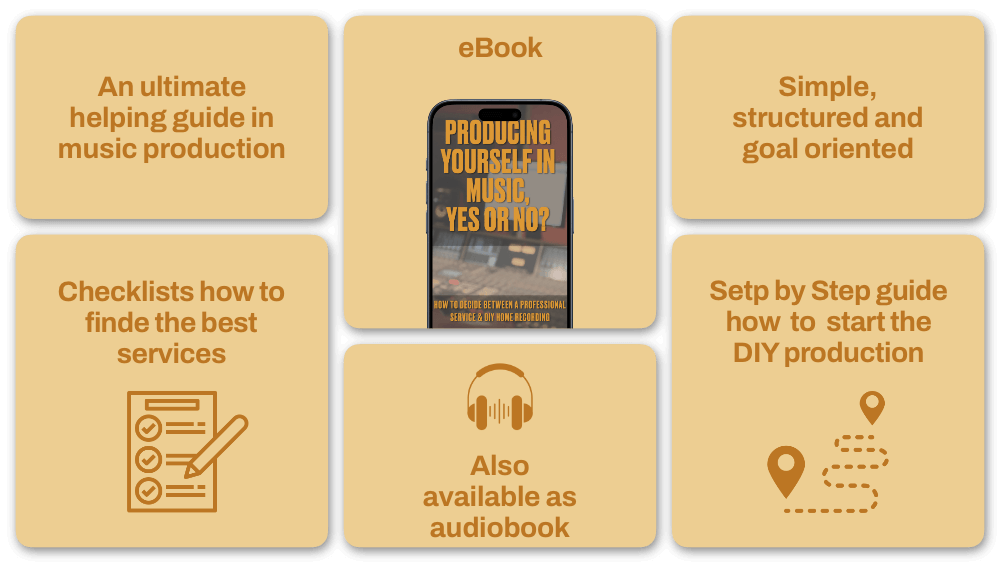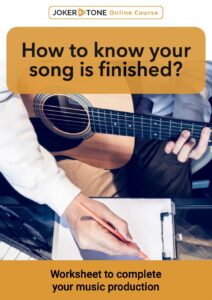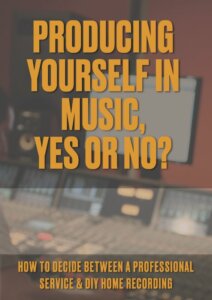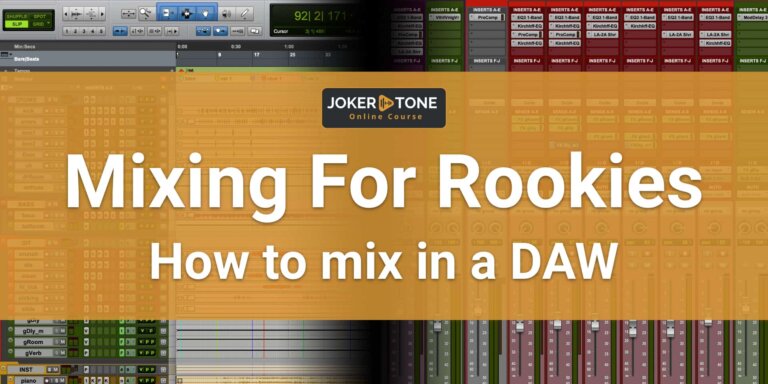I’m incredibly excited to share with you a very special episode – especially if you’re a music artist just beginning your journey as a self-producer. Whether you’re dabbling in your first home studio setup or already trying to get your songs to sound how they do in your head — this episode could save you hours of frustration, wasted money, and creative burnout.
Today, I’m diving into the five common mistakes nearly every beginner self-producing artist makes. These are drawn from my own journey, countless conversations with fellow artists, and what I constantly see in music production communities and forums.
If you’ve ever thought you need fancy gear to sound pro, felt overwhelmed by plugins, or found yourself bouncing between writing, recording, and mixing — this episode is for you.
That’s why today’s episode is all about 5 Common Mistakes Self-Producing Artists Make. I’m not here to point fingers, but to share valuable lessons learned through personal trials, conversations with other indie producers, and experiences in online music communities. If you’re someone who just started producing your own music or a beginner looking to improve, this episode is your roadmap to success.
Let’s explore these common traps – and how to confidently avoid them so you can stop wasting time and money, and start producing the music you love in an intelligent, strategic way.
5 Common Mistakes Self-Producing Artists Make:
1. Expensive Gear Won’t Save Your Audio — But Skills Will
Let’s be honest — shiny hardware is sexy. I’ve bought it. I’ve sold it. I know that dream of thinking, “If I just get that new interface or $2,000 mic, my sound will magically become studio-grade.”
Here’s the truth: Pricey hardware won’t fix your sound if your skills and environment aren’t ready for it.
Why Expensive Gear Isn’t a Shortcut to Talent
We’ve all been there. You see that shiny, high-end compressor, or that top-shelf interface on sale, and you think, “If I just had this, I’d finally sound professional.” Wrong. This is the first of the 5 Common Mistakes Self-Producing Artists Make — thinking that gear solves your problems.
I’ve made this mistake myself. Buying and trying everything from boutique microphones to luxury preamps. But here’s the truth: gear doesn’t replace skill. If you don’t know how to use what you already have, no fancy hardware is going to magically improve your productions.
You could have the best mic in the world, but if you can’t hear correctly in your space, none of it matters. You can’t fix what you can’t hear.
Most of the time, you already have what you need to make incredible music. Instead of reaching for your wallet, reach for your time and start building your skillset. Learn how your existing gear works. Master your DAW.
And if you do want to spend money, invest in:
- Your room acoustics (treat your space – it matters more than your gear)
- Your monitoring setup (good speakers or headphones)
- Learning resources (books, online courses, or even a mentor)
Instead, focus on leveling up your skill set. That could mean diving into tutorials, reading production books, or getting guidance from a mentor. You’re better off spending your budget on acoustic treatment for your room and optimizing your monitoring situation. These are foundational elements that will dramatically improve your decision-making during recording and mixing — far more than any piece of expensive gear.
2. Plugins Aren’t the Magic Bullet You Think They Are
We’ve all been in the plugin rabbit hole. There’s a new one released every week, promising vintage warmth, analog coloration, or AI-enhanced mixing capacities.
But guess what? More plugins won’t fix the core problems in your recordings: your tracking and performance techniques.
Plugins Won’t Solve Your Production Weakness — Learn to Capture the Best Sound at the Source
Here comes mistake number two: accumulating plugins like they’re Pokémon. One of the most frequent 5 Common Mistakes Self-Producing Artists Make is believing that the solution to every issue is a new plugin.
I get it — the plugin market is full of promises. AI-powered mixing? Vintage emulations? It’s a rabbit hole — and I’ve fallen in multiple times. But here’s the truth: if your recording isn’t clean or well-performed, no plugin can save it.
Before you download yet another plugin, consider:
- Improving your recording technique
- Practicing your performance to minimize editing later
- Learning what the stock plugins in your DAW can already do (you’ll be surprised)
Take something as basic as de-essing. Don’t just grab the latest AI de-esser. First, ask: Is my mic right for my voice? Am I placing it correctly? Could I improve my singing technique to reduce harsh “S” sounds?
Start addressing problems at the source, during tracking. Better recordings = less fixing in post = more time for the creative, musical parts of production.
Instead of searching for a new de-esser, analyze your vocal recordings. Try repositioning your mic, using a different one, or improving your vocal technique to eliminate harsh “S” sounds before hitting record. The fewer issues you introduce during recording, the less fixing you’ll need later.
You probably already own all the essential plugins within your DAW. Learn to use them inside out. The more confident you are with the tools you have, the faster your workflow, and the better your mixes.
3. You Won’t Become A Self-Producing Artist Overnight
I get it. You want to do it all — write your music, record it, mix it, master it — and you want to be great at it.
But becoming a good producer takes time. You’re not only wearing one hat — you’re switching between artist, engineer, writer, mixer, and more. And your first few projects? Yeah, they’ll probably sound rough. Mine did. That’s okay.
You Can’t Become a Pro Self-Producer Overnight — Give Yourself Time to Grow
One of the most heartbreaking reasons artists abandon self-producing is this unrealistic expectation: that they should be professional-level engineers and producers overnight. This is one of the most silently destructive 5 Common Mistakes Self-Producing Artists Make.
You’re learning a completely new set of skills — recording, editing, mixing, mastering — each with its own complexities. Of course your first few mixes won’t sound like Billboard hits. They’re not supposed to.
Don’t compare your first mix to your favorite band or top-level producers. They’ve got 10+ years on you. That comparison only kills your motivation.
Instead, keep these things in mind:
- Accept that your early results won’t be perfect
- Be aware of your progress, not perfection
- Learn from each project, even (especially) the failures
Set realistic expectations. Be patient with your journey. Each song you produce is a learning classroom. The more you work, the better you get. Period.
Take time. Make bad mixes. Learn. Evolve. Then do it again. Every failure is part of the process. What you shouldn’t do is compare your day-one productions to the polished work of professionals who’ve been at it for decades.
Set fair expectations. Measure progress based on your own timeline. Learn to enjoy building your skills instead of chasing perfection. This mindset shift will keep you motivated and grounded through your journey.
4. Don’t Try To Write, Record, and Mix in One Sitting
This one’s huge. So many artists try to do everything at once — start writing, immediately record, then edit and mix it right after. But switching mental gears from artist to engineer isn’t easy. These are different roles that require different mindsets.
Stop Blending Roles: Separate Artist from Engineer to Boost Efficiency and Creativity
Mistake number four is attempting to write, record, edit, and mix all in one session without switching hats. As a self-producing artist, you play many roles. But trying to juggle all at once can cause missed details, lack of focus, and emotional decision-making that hurts your final product.
That’s why I recommend separating your roles intentionally.
Here’s the fix: structure your workflow into phases — and split them across different days if possible.
For example:
- Day 1: Writing and arranging — you’re the creative artist
- Day 2: Recording — you’re both artist and mini-engineer
- Day 3: Editing — now you put on your engineer hat
- Day 4: Mixing — fully in engineer mode
- Day 5: Review and revisions — wear both hats strategically
Separating these tasks helps you stay focused, reduces burnout, and improves decision-making. Artists often want to “leave in” their favorite parts, but as an engineer, you’ll realize some moments just don’t serve the song. Understanding when to cut and when to keep makes your music better.
Be the artist on the writing day. Be the engineer on the mix day. Structuring your process like this improves objectivity, energy, and productivity.
As the songwriter and performer, you’re emotionally connected to your creation. But the mixer has to make tough decisions — like cutting that harmony line that’s cluttering the chorus. By switching roles, you develop a more professional and strategic ear.
This simple change helped me dramatically improve my output speed and mix quality. It keeps your brain from overloading and helps you fully embrace both the creative and technical sides of production.
5. You Can’t (and Shouldn’t) Do It All Alone
Many self-producing musicians fall into the trap of thinking they have to literally do everything themselves. But let’s break that down.
If you’re responsible for writing, recording, editing, mixing, rehearsing, booking gigs, promoting your music, creating visuals, and playing live shows — when will you eat? Sleep? Breathe?
The reality: You will run out of time and energy if you try to do it all. So ask yourself:
- What can I delegate?
- Who can help me?
- What tasks are outside my strengths?
Doing Everything Alone Will Burn You Out — Learn to Delegate Where It Counts
The final — and most dangerous — of the 5 Common Mistakes Self-Producing Artists Make is wearing every single hat from writing and producing to promoting and gig booking. Yes, self-productions offer independence. But total isolation leads to overwhelm and creative burnout fast.
Being self-sufficient doesn’t mean you do everything yourself. It means you’re free to choose what to handle and what to delegate. Maybe that’s hiring a freelance mixer, finding someone to handle your gig bookings, or working with a virtual assistant to manage promo.
Time is your most valuable resource. You need it for writing, rehearsing, and maybe playing live. If production tasks are eating that time, your creativity suffers. Focus on where you create the most value — often writing and performing — and outsource the rest when possible.
Some ideas:
- Partner with someone for promotion
- Let someone else handle your gig bookings
- Work with another artist on visuals or branding
If budget is an issue, consider trades. Maybe you mix for someone in exchange for them handling your email list.
Self-producing doesn’t mean solo-producing. Knowing what to outsource is a valuable skill and a sign of a professional mindset.
Trust me, I’ve learned this the hard way. Delegating doesn’t make you less of an artist; it turns you into a strategic artist.
Final Words: Where You Should Focus as a Beginner
To quickly summarize, here are the critical 5 Common Mistakes Self-Producing Artists Make that we covered in detail.
Let’s recap the big takeaways:
- Thinking expensive hardware upgrades your sound — skill and environment matter more.
- Believing plugins can fix bad recordings — focus on improving your performance and capture.
- Rushing the learning curve — give yourself time to grow and enjoy the journey.
- Failing to separate artist vs. engineer roles — divide your workflow to serve each role properly.
- Believing you must do it all alone — learn to collaborate and delegate where possible.
If you’re just starting or even struggling in your early producing process — I want to tell you: You are not alone. We’ve all been there. And with some focus, time, and the right mindset, you’ll absolutely get better at self-producing your music.
So, whether you’re recording your debut EP or just started messing around in your DAW, give this episode a full listen. I promise you it’s packed with music production tips, mindset shifts, and battle-tested strategies to help you become the artist-producer you dream of being.
Thanks for tuning in, and I’ll catch you next episode. Stay creative!
Want to dive deeper into this topic? Listen to the full episode now and start transforming your music production journey today.
Bonus Resource: “Producing Yourself in Music: Yes or No” E-Book
To offer even more value, I’ve created a eBook (and audio book) guide called “Producing Yourself in Music: Yes or No.” It breaks down when DIY production is the right choice, when you may benefit from external help, and how to strategically balance both worlds for maximum success.

You can grab it right now at 👉 jokertonecourse.com/producingyourself
If this episode resonated with you, I encourage you to listen to the full podcast — we go deep into each point with real-world examples and helpful advice that can save you months (or years) of trial and error.



